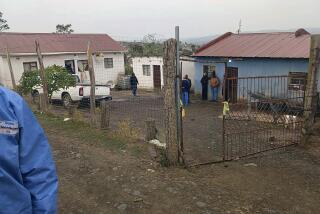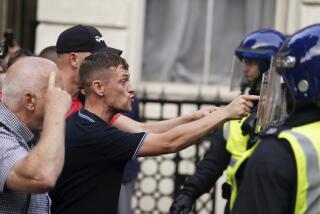South African Police Slay 4 in Separate Clashes
- Share via
JOHANNESBURG, South Africa — Police shot dead three blacks and a mixed-race man in eastern Cape province in separate clashes, including one in which blacks hurled 15 gasoline bombs at a police vehicle, the government said Saturday.
Meanwhile, the visiting leaders of U.S., British and West German trade union movements appealed to the government to let them see jailed black union officials.
Barry Brendan, a spokesman for the British Trades Union Congress, said that in talks with South African union federations, the foreign labor leaders “have heard reports of horrific beatings and are gravely worried about the detainees’ families and the unions’ ability to function properly.”
The latest violence was confined to the eastern Cape region, one of the worst hit by daily unrest that began in September, 1984. More than 2,000 people have been killed nationwide in anti-apartheid rioting and related violence between black groups, according to private monitoring groups.
Police Patrol Attacked
In a summary of violence in the 24 hours ending Saturday morning, the Bureau for Information in Pretoria said blacks attacked a police patrol with 15 firebombs in Zwide, a black township, and that police fired two shots and killed a 19-year-old black man.
In Walmer, another Port Elizabeth district, blacks stoned a security force foot patrol, which fired one round and shot dead a black man, the bureau added.
In Fingo township near inland Grahamstown, security forces killed a black man when blacks stoned a black councilor’s house. In a similar attack on the home of a security force member in the mixed-race township of rural Dysseldorp, police killed a mixed-race man among the attackers, the bureau said.
The killings brought to 162 the death toll in violence since the nationwide state of emergency was imposed June 12. The government says most victims have been blacks slain by other blacks, not by security forces.
The foreign trade union delegation arrived Friday on a four-day visit to show solidarity with about 270 black union leaders detained without charge under the emergency, according to academic monitoring groups.
More to Read
Sign up for Essential California
The most important California stories and recommendations in your inbox every morning.
You may occasionally receive promotional content from the Los Angeles Times.













